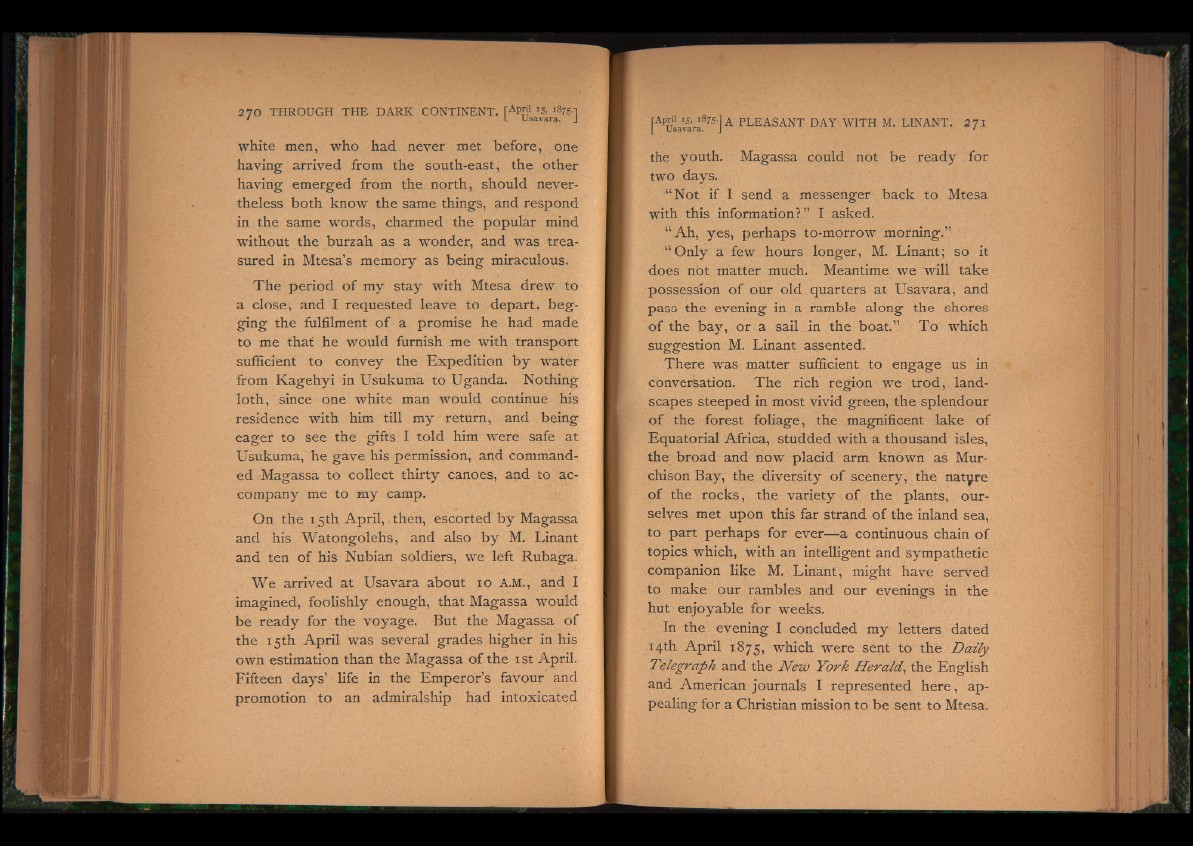
white men, who had never met before, one
having arrived from the south-east, the other
having emerged from the north, should nevertheless
both know the same things, and respond
in the same words, charmed the popular mind
without the burzah as a wonder, and was treasured
in Mtesa’s memory as being miraculous.
T h e period o f my sta y with Mtesa drew to
a close, and I requested leave to depart, b e g ging
the fulfilment o f a promise he had made
to me that he would furnish me with transport
sufficient to convey the Expedition b y water
from K a g eh y i in Usukuma to Uganda. Nothing
lo th , ' since one white man would continue his
residence with him till my return, and being
easrer to see the gifts I told o o him were safe at
Usukuma, he gave his permission, and commanded
Magassa to collect thirty canoes, and to accompany
me to my camp.
On the 15th April, then, escorted b y Magassa
and his Watongolehs, and also b y M. Linant
and ten o f his Nubian soldiers, we left Rubaga.
W e arrived at Usavara about 10 A.M., and I
imagined, foolishly enough, that Magassa would
be re ad y for the vo y a g e . But the Magassa o f
the 15th A p ril was several grades higher in his
own estimation than the Magassa o f the 1st April.
Fifteen d ays’ life in the Emperor’s favour and
promotion to an admiralship had intoxicated
[Apuiavarl875]A PLEASANT DAY WITH M. LINANT. 271
the youth. Magassa could not be ready for
two days.
“ Not if I send a messenger back to Mtesa
with this information?” I asked.
“ Ah, yes, perhaps to-morrow morning.”
“ Only a few hours longer, M. Linant; so it
does not matter much. Meantime we will take
possession o f our old quarters at Usavara, and
pass the evening in a ramble along the shores
o f the bay, or a sail in the boat.” T o which
suggestion M. Linant as,sented.
There was matter sufficient to engage us in
conversation. The rich region we trod, landscapes
steeped in most vivid green, the splendour
o f the forest foliage, the magnificent lake o f
Equatorial Africa, studded with a thousand isles,
the broad and now placid arm known as Murchison
Bay, the diversity o f scenery, the nature
o f the rocks, the variety o f the plants, ourselves
met upon this far strand o f the inland sea,
to part perhaps for ever— a continuous chain o f
topics which, with an intelligent and sympathetic
companion like M. Linant, might have served
to make our rambles and our evenings in the
hut enjoyable for weeks.
In the evening I concluded my letters dated
14th Ap r il 1875, which were sent to the D a ily
Telegraph and the New York H erald , the English
and American journals I represented h e re , appealing
for a Christian mission to be sent to Mtesa.